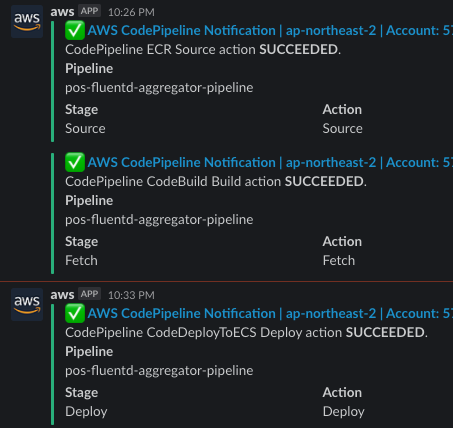This repo was created for the purpose of storing logs collected from multiple swarm clusters on Elastic Search.
You may utilize my fluent-bit-docker-metadata to ship logs to the aggregator from edge swarm cluster.
As shown in the following configuration file, the collected logs are dynamically indexed to ElasticSearch according to the log properties using record_transformer filter and elasticsearch dynamic plugin. e.g.) shinhan-aiagent-2020.08.15
<filter docker.**>
@type record_transformer
<record>
service_name ${tag_parts[1]}
</record>
</filter>
<match docker.**>
@type elasticsearch_dynamic
host "#{ENV['ES_HOST'] || 'elasticsearch'}"
port "#{ENV['ES_PORT'] || '9200'}"
user "#{ENV['ES_USER'] || 'elastic'}"
password "#{ENV['ES_PASSWORD'] || 'changeme'}"
scheme "#{ENV['ES_SCHEME'] || 'http'}"
ssl_verify "#{ENV['ES_SSL_VERIFY'] || 'false'}"
ssl_version TLSv1_2
logstash_format true
logstash_dateformat %Y.%m.%d
logstash_prefix ${record['biz_client']}-${record['service_name']}
...
On your mac, you can test the following pipeline by deploying a swarm cluster of four docker machines. Note that ES in your swarm dose run as standalone for testing.
fluent bit -> fluentd -> elastic search -> kibana
To deploy a swarm cluster:
$ make node-up
Build fluent-aggregator in docker-machine:
$ eval $(docker-machine env node-m1)
$ make docker-build
To start services:
$ make stack-start
You can access kibana with http://192.168.128.101 since the host IP keeps always the same value even if the docker machine is deployed multiple times.
To change a certification with a customized domain:
$ DOMAIN=awesome.domain make node-gen-cert
We create and manage per-project isolated development environments according to the 12factor using direnv
Chanege to local env:
$ make envrc-local
Change to prod env:
$ make envrc-prod
You may need to set up the following values in production with AWS Cloud and Elastic Cloud to deploy using Terraform:
export PROJECT_NAME=ziwon
export APP_NAME=fluentd-aggregator
export AWS_ACCOUNT_ID=57xxxxxxxxxx
export AWS_REGION=ap-northeast-2
export AWS_PROFILE=default
export VPC_ID=vpc-xxxxxxxxx
export ECR_IMAGE_URL=${AWS_ACCOUNT_ID}.dkr.ecr.${AWS_REGION}.amazonaws.com/${APP_NAME}
export TAG=latest
export ES_HOST=elastic.ap-northeast-1.aws.found.io
export ES_PORT=9243
export ES_USER=elastic
export ES_PASSWORD=changeme
export ES_SCHEME=https
export ES_SSL_VERIFY=true
$ make
Usage: make [command] [args]
Makefile:envrc-local Change environment to local development (e.g. make envrc-local)
Makefile:envrc-prod Change environment to prod development (e.g. make envrc-prod)
Makefile:help Show this help message (e.g. make help)
docker.mk:docker-build Build docker image (e.g. make docker-build)
docker.mk:docker-commit Commit current container using killed tag (e.g. make docker-commit)
docker.mk:docker-history Show the history of an image (e.g. make docker-history)
docker.mk:docker-push Push an image to Amazon ECR registry (e.g. make docker-push)
docker.mk:docker-run Run a command in a new container (e.g. make docker-run)
swarm.mk:node-add-cert Add certification into the local machine (e.g. make node-add-cert)
swarm.mk:node-cleanup Clean up the docker volume (e.g. make node-cleanup)
swarm.mk:node-down Terminate swarm nodes (e.g. make node-down)
swarm.mk:node-gen-cert Generate SSL certification (e.g. make node-gen-cert)
swarm.mk:node-ip Show the address of node (e.g. make node-ip)
swarm.mk:node-list Show node list (e.g. make node-list)
swarm.mk:node-up Bootstrap swarm nodes (e.g. make node-up)
swarm.mk:stack-exec Get executed the given command into container (e.g. make stack-exec sh)
swarm.mk:stack-logs Show logs from the service (e.g. make stack-logs elasticsearch)
swarm.mk:stack-ps List stack process (e.g. make stack-ps)
swarm.mk:stack-reload Reload the stack from swarm (e.g. make stack-reload)
swarm.mk:stack-service List stack services (e.g. make stack-service)
swarm.mk:stack-start Start the stack onto swarm (e.g. make stack-start)
swarm.mk:stack-stop Remove the stack from swarm (e.g. make stack-stop)
swarm.mk:stack-viz Visualize the swarm stack (e.g. make stack-viz)
All the terraform files are in infra directory.
| Name | Version |
|---|---|
| terraform | ~> 0.12.0 |
| aws | ~> 2.57.0 |
| null | ~> 2.0 |
| Name | Version |
|---|---|
| aws | ~> 2.57.0 |
| null | ~> 2.0 |
Fluentd Aggregator runs as one ECS Fargate application, is deployed in a Blue/Green deployment, and routes the traffic load to the Network Load Balancer.
module "app" {
source = "./modules/app"
internal_load_balancer = false
vpc_id = var.vpc_id
app = local.app_id
region = var.region
environment = var.environment
service_replicas = var.service_replicas
task_definition = var.task_definition
pipeline_image_tag = var.pipeline_image_tag
primary_domain = var.primary_domain
dns_name = "${var.project}-${var.app}.${var.primary_domain}"
certificate_arn = var.certificate_arn
kms_arn = local.kms_arn
repository_name = var.repository_name
enable_cpu_high_alarm = true
enable_cpu_low_alarm = false
tags = merge(
map("Last Updated", "${module.global.build_time}"),
var.tags
)
}
We assume that all the environment variables with your AWS Cloud are properly injected to .envrc.prod
Set up your aws profile:
$ make tf-aws-profile
AWS Access Key ID [****************J5JJ]:
AWS Secret Access Key [****************VCWH]:
Default region name [ap-northest-2]:
Default output format [json]:
Intialize your terraform:
$ make tf-init
Generate tfvars according to .envrc.prod:
$ make tf-vars
Generates and show an execution plan:
$ make tf-plan
Builds or chagnes infrastructure:
$ make tf-apply
$ make
Usage: make [command] [args]
Makefile:help Show this help message (e.g. make help)
Makefile:tf-apply Builds or changes infrastructure (e.g. make tf-apply {project} {env})
Makefile:tf-aws-profile Configure aws profile (e.g. make tf-aws-profile)
Makefile:tf-clean Clean the Terraform-generated files (e.g. make tf-clean)
Makefile:tf-destroy Destroy Terraform-managed infrastructure (e.g. make tf-destroy {project} {env})
Makefile:tf-get-tools Install tools for development (e.g. make tf-get-tools)
Makefile:tf-import Import existing infrastructure (e.g. make tf-import {project} {env} {resource} {arn})
Makefile:tf-init Initialize s3 backend (e.g. make tf-init {project} {env})
Makefile:tf-lint Lint the Terraform files (e.g. make tf-lint {project} {env})
Makefile:tf-plan Generate and show an execution plan (e.g. make tf-plan {project} {env})
Makefile:tf-pull Get remote state to local (e.g. make tf-pull)
Makefile:tf-refresh Refresh the state file with infrastructure (e.g. make tf-refresh {project} {env})
Makefile:tf-vars Create a tfvars file per environment (e.g. VPC_ID=vpc-53a49e3b make tf-vars {project} {env})
Makefile:tf-vpc-id Show the VPC ID with the given group (e.g. make tf-vpc-id {group})
To enable the notification of AWS CodePipeline to the slack, you may need to change the following value to yours:
arn:aws:chatbot::57xxxxxxxxxx:chat-configuration/slack-channel/your-slack-noti
infra/modules/app/notification.tf
resource "aws_codestarnotifications_notification_rule" "deloy" {
detail_type = "FULL"
event_type_ids = [
"codepipeline-pipeline-action-execution-failed",
"codepipeline-pipeline-action-execution-succeeded",
"codepipeline-pipeline-pipeline-execution-failed",
"codepipeline-pipeline-manual-approval-failed",
"codepipeline-pipeline-manual-approval-succeeded"
]
name = "deploy-${var.app}"
resource = aws_codepipeline.main.arn
# The terraform not support AWS Chatbot (Beta)
target {
address = "arn:aws:chatbot::57xxxxxxxxxx:chat-configuration/slack-channel/your-slack-noti"
type = "AWSChatbotSlack"
}
tags = var.tags
}
(TBD)
(TBD)
